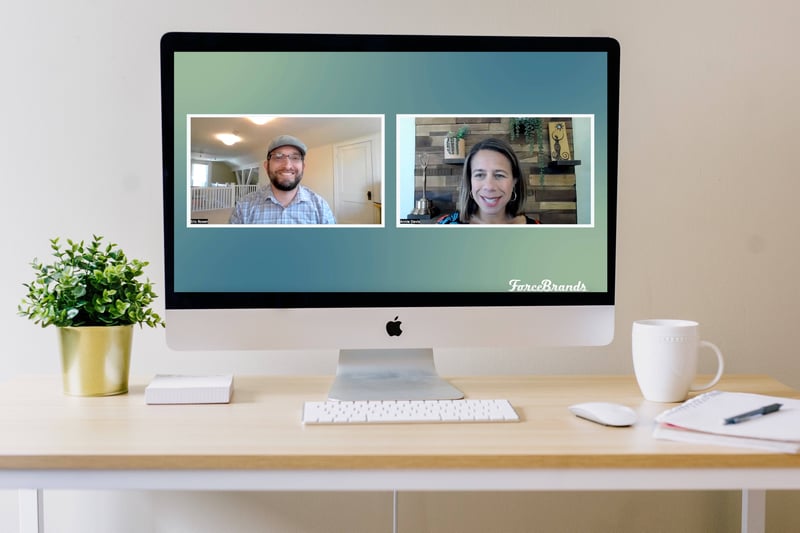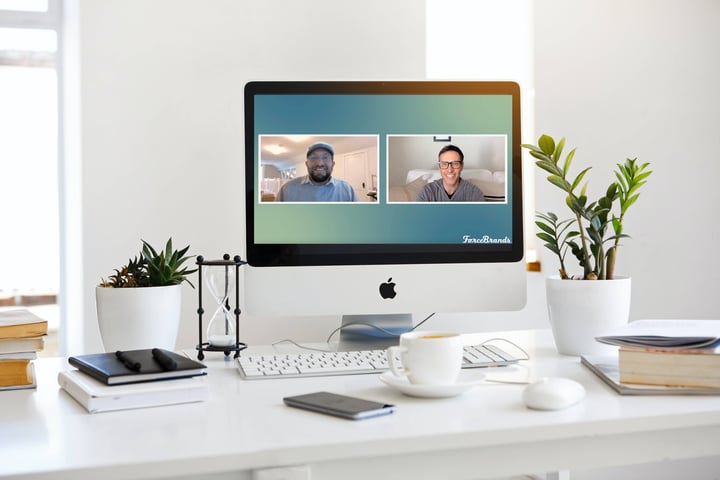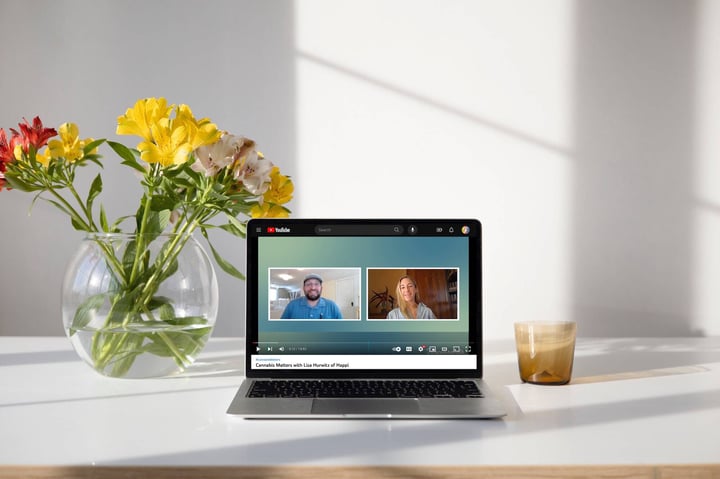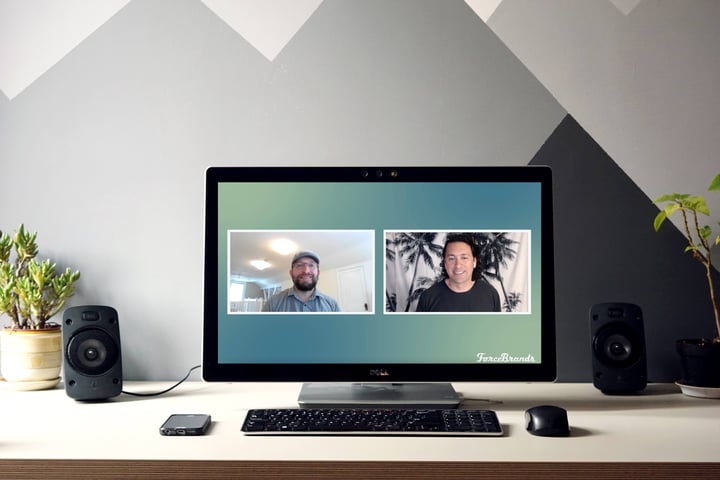
After spending 15 years leading marketing, business development, and strategic account management in traditional CPG and the natural foods industry, Annie Davis made the move into the cannabis space. Inspired by its potential for positive social, environmental, and economic impact, she now leads the marketing and business development efforts for purpose-driven cannabis companies.
In this episode of Cannabis Matters, ForceBrands‘ Cannabis Client Strategist and series host Eric Rosen catches up with her to learn more about her career journey and how the buzzy acronym ‘ESG’ is being leveraged as an agent for attracting and retaining talent in today’s burgeoning industry.
Watch our exclusive interview with her and read the full transcript below.
Eric Rosen: Annie, thanks so much for carving out the time to be with us today.
Annie Davis: Thanks so much for having me, Eric.
ER: Yeah, it’s our pleasure. You have a really interesting background. I’m curious to hear what your journey looks like and what inspired you to work exclusively with cannabis brands.
AD: It’s definitely something that has been on my mind for many, many years before I actually took the plunge to work in this industry and the plant has been monumentally helpful to me personally in managing anxiety, stress, and insomnia — things that tend to plague many type-A personalities and I found as I’ve become more open with my own personal cannabis use, I find many other high achieving professionals who also have turned to cannabis but have been closeted about it until fairly recently.
Cannabis has always been a personal interest and passion for me and then I worked in another emerging industry or at the time it was emerging. I worked in clean tech and renewable energy and so developed an expertise in marketing and positioning new and emerging products and services that took on and challenged traditional incumbents so in the case of cannabis, positioning cannabis as an alternative to opioids, tobacco, alcohol, and other potentially harmful, more harmful, substances when Prop 64 passed in California and cannabis was legal for both medical and adult use, I decided to get off the sidelines and jump into this industry and I really haven’t looked back.
ER: You’ve done some particularly intriguing work in this world of ESG — of environmental, social, and corporate governance — and these things like corporate social responsibility are very commonplace table stakes in the outside world, probably a little bit more net new inside of cannabis so I’m really interested to hear your take on the relationship between ESG and company culture, particularly in emerging markets.
AD: In the early days back in the early 2000s/mid-2000s when corporate social responsibility and sustainability were just kind of becoming buzzwords and becoming like an emerging focal point for large corporations, these activities and initiatives were really seen as oftentimes as cost centers and initiatives that like maybe a company would take on once they had solidified and shored up their core business, so once you’re profitable and you’re making money and everybody’s happy in your company, then you can look at corporate social responsibility, then you can look at sustainability, and I think as the movement around corporate responsibility has evolved and we’ve evolved to looking at ESG as environmental, social, and governance, we are now able to really look at like individual drivers of social environmental impact.
When you look at company culture and ESG in that lens — specifically around corporate governance — but also around how we treat and manage our employees inside our organizations, we can look at a couple of different metrics, one of which is talent attraction, especially millennials and Gen Zers who are increasingly seeking to work for companies that exhibit strong values in terms of their community involvement, strong values in terms of how they treat their workers, and in terms of how they’re stewarding their environmental impact on the planet. So certainly you can use ESG as a driver for talent attraction but I think even more so it really can be a firm driver of talent retention.
ER: Annie, I think it’s a foregone conclusion at this point that diversity and corporate social responsibility lead to ROI, the data shows that, and it seems like ESG leads to the same place from an external perspective. What have you seen companies do from an internal standpoint shifting as it’s a candidate’s market today, people move around a lot, especially within cannabis. How are you seeing ESG play out in the cannabis space today to keep the workforce happy, healthy, engaged, and most importantly, retained.
AD: One thing specifically that we are beginning to see in cannabis that again is table stakes in many of most other industries are kind of support and affinity groups for individuals within these companies to connect with and feel allyship with fellow employees in similar life stages, place in time, culturally, so employee resource groups, for instance, women’s groups to support women inside these organizations.
I’m just in the process of organizing a women’s group of senior marketing executives from across cannabis to meet on a monthly basis so that we can support one another as peers but also share resources, share knowledge and best practices, specifically as a way to help retain senior-level women in these roles because it’s a challenging industry for many reasons and I think that as marketers, we all have shared challenges and as women, we have shared challenges, and the idea of creating support and camaraderie amongst competitors who can also cooperate can go a long way.
ER: You’re a fund advisor in West Creek Investments, which must be very exciting because you get to have an interesting and valuable vantage point into the marketplace and sort of how very early stage companies are thinking about going to market. What does it look like? Can you paint us a picture of what an ideal model looks like with respect to having both an investing arm as well as an operating arm to add value and ultimately de-risk portfolio holders?
AD: This is a topic about which I’m personally very passionate having come from traditional CPG and natural products where there was a strong presence of venture capital and private equity in terms of like growth capital but also in terms of operational support and resourcing, especially for companies in the emerging industries in which I participated previously like renewable energy and sustainable packaging, that these were new technologies taking on as I mentioned earlier these incumbents and the importance of scaling and resourcing effectively to most efficiently utilize funds in our growth.
One of the things that was most helpful when I was part of those companies was a network of advisors and consultants that could help us to not reinvent the wheel, to learn from best practices from these incumbent industries that we were taking on, and also scale in a resource-effective way where we weren’t having to hire a number of full-time executive roles in order to gain that level of expertise in our organization. Five years ago there were not many experienced operators.
Now, 2022 after the experience of folks who have worked in Colorado, California, and Washington, we are beginning to have experienced professionals across cultivation, manufacturing, tech, marketing — what have you. My personal hypothesis is that combining growth capital with a network of strong operating partners to de-risk portfolio investments but also create synergies between them is one way to really accelerate growth in this industry and especially the growth of independent operators, independent plant-touching operators that are not already connected to any of the more like well-capitalized MSOs.
ER: And from a VC perspective, when you’re vetting companies, how do you think about ESG from a team standpoint because to your point individuals are leveling up. You have more qualified talent today, more specialized talent today in cannabis than ever before but from a team standpoint, what are you looking for? And if you don’t see what you’re looking for, how do you coach stakeholders to really level up their talent at both the individual and team levels so they can maximize the future state of ESG?
AD: Yeah it’s a great question. I mean I definitely look for diversity and diversity is not just race or gender but also levels of experience and from where the entrepreneurs have come but also teams of advisors, as well as potential future hires for that team so certainly I see a strong value in diversity and I also don’t believe that one has to necessarily represent like the customer, consumer, segment, or audience that your business is going after but I do think having at least a lens within your team, let’s say you’re a brand or a product or service that it purports to target seniors let’s say, having some lens within your team of somebody who is over 55 and maybe like represents that consumer group might be useful. So I think definitely having that degree of diversity is important.
ER: So if you could give one piece of advice to growing cannabis companies today that are potentially looking to raise capital, what would you tell them to be thinking about in terms of how to keep your people? From a retention standpoint, you want to start with the end in mind so now that they’re at the beginning stages what’s the one piece of advice you would give them to maximize employee retention?
AD: I think I would suggest that as early on as possible they bring a team member into their fold that has a strong track record of building teams and prioritizing people and culture, not just a recruiter, you can use ForceBrands for that, but somebody who can be inside your organization day-to-day setting up programs that can retain your employees through having strong offerings in terms of HR support, affinity groups, community involvement, etc.
Oftentimes in cannabis, there isn’t a dedicated people and culture lead. The responsibility for kind of maintaining team morale tends to fall disproportionately on people managers, on the line managers, who are also responsible for doing their day job. I’ve been in positions myself where I was in charge of marketing for an entire cannabis house of brands and yet I also was the only person really looking out for the wellbeing and the best interest of my people and my team because I didn’t have a strong human resources partner in the organization.
I think that oftentimes — kind of similar to ESG initiatives — having people and culture leads within organizations is seen as an afterthought or something that you can do once your team is built so you’re going to focus on recruiting first and then bringing in somebody who is an HR generalist (I’m really like a people in culture lead) and I think there’s a clear difference between the skill sets of somebody who is great at sourcing and somebody who is great at culture and team/morale building.
ER: From a what’s-best-for-employees-and-culture-and-ESG standpoint, are you most excited about federal legalization happening or do you think a state-by-state model would actually serve the evolution of company culture in cannabis.
AD: It’s a great question. I think from a sustainability perspective in terms of environmental sustainability, I think federal legalization will be beneficial because we will be able to produce cannabis and manufacture it in the regions where it is least costly and least environmentally harmful. So for instance, be able to grow cannabis in states like Colorado, California, New Mexico, and Arizona, and export it to other parts of the country as well as then kind of enabling regions to focus on what they do best. But it’s interesting, I think from a social standpoint, that will potentially result in the loss of jobs that are currently existing in every state that has legal cannabis around cultivation, manufacturing, and distribution. So I think there are pluses and minuses to both. One fear I do have with regard to federal legalization and the influx of institutional capital is the kind of overtaking of independent operators in small business by large corporate conglomerates that are not yet playing in cannabis — let’s say like tobacco, alcohol, big pharma, etc. So I think that’s one reason why we have this unique opportunity in this limited window of time right now to try and build and structure strong, resilient corporate corporations within cannabis that can withstand the pressures that are going to come in when legalization happens.
ER: Annie, I always enjoy connecting. It’s always an absolute pleasure and I just want to say thank you from the bottom of my heart for the time and your perspective and expertise that you shared with us today.
AD: Thanks so much for having me, Eric. It’s always a pleasure with you as well.
Catch up on more episodes from Cannabis Matters here.
Interested in learning more about the cannabis industry and how ForceBrands’ cannabis practice can help grow your business or career? Reach out to Eric Rosen to start the conversation.
Rebecca Fryer
Rebecca is the Senior Editorial Director at ForceBrands. She’s spent 12+ years on the editorial side of digital media, curating original content and managing social media audiences for impactful brands and businesses. She’s a natural storyteller with a love for connectivity and brand building.



